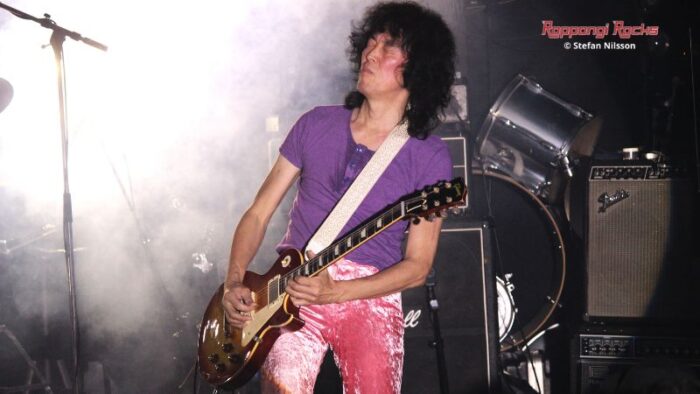Published in Nikkei Asia on 15/3/2024
I’m sitting in the front row, almost close enough to touch Jimmy Page’s sky blue jacket. Page, leader of the legendary rock band Led Zeppelin, is in the midst of a lengthy number called “Dazed and Confused,” which requires him to run a violin bow across the strings of his electric guitar, thereby producing a series of mournful and disturbing sounds.
At least, the figure on stage looks, sounds and moves like Jimmy Page, but of course Led Zeppelin disbanded in 1980. The charismatic riff-meister is now 80 years old and living a quiet life in a haunted house in London with his girlfriend, a flame-haired 34-year-old poet he met a decade ago.
The rail-thin man with the ringlets hanging over his face in the Tokyo live music venue is Akio Sakurai, also known as Jimmy Sakurai or just “Mr. Jimmy.” A former kimono salesman from snowy Niigata Prefecture, he has dedicated more than 30 years of his life to reproducing with astonishing authenticity what he calls “the sound magic of Jimmy Page.” Thus tonight, he is wearing the same kind of satin bell-bottoms that Page wore in 1968 and 1969, using the same guitars and picks and, naturally, striking the same rock god poses.
This particular performance is modelled on the band’s early and, some would say most creative, period. Typical of Sakurai’s scholarly approach is the opening song, “Train Kept A-rollin’,” a staple of Page’s previous band, The Yardbirds, who can be seen playing it in Michelangelo Antonioni’s 1966 film “Blowup.”
More to the point, it was the first number that Led Zeppelin played when the four musicians came together for their very first rehearsal. Like several other songs Sakurai performed for us, the band never recorded it. His faithful renditions are the result of close study of super-rare bootlegs.
Tribute bands abound in Japan, with credible imitators doing Jimi Hendrix, Janis Joplin, the Rolling Stones and many more. One of the most celebrated is The Parrots who have been performing the music of The Beatles from their home ground at the Abbey Road club in Roppongi for decades. They have played in front of such notables as former U.S. ambassador Caroline Kennedy, President Marcos of the Philippines and Paul McCartney himself.
Their leader, the late lamented Mamoru “Chappy” Yoshii who died in 2017, was a professional John Lennon for thirty eight years, just two years less than John Lennon was John Lennon. He fulfilled his role with remarkable verisimilitude, including traces of a Liverpool accent despite having little proficiency in English. Now a new and much younger adept has taken over.
Even amongst such experienced and skilled performers, Sakurai stands out for the intensity of his approach. Every detail must be right, from the creases in a shirt similar to one Page wore at a particular concert, to the vintage amplifiers he uses. Just as the great director Akira Kurosawa would place antique objects in cupboards on his sets, even though they could not be seen, so Sakurai uses authentic equipment to transport himself into a different reality.
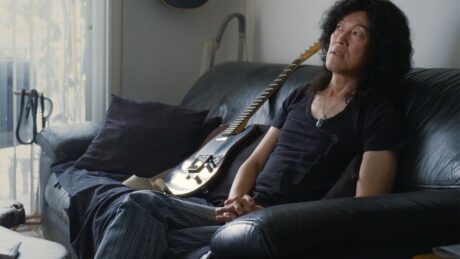
Jimmy S in contemplative mood
On his You Tube channel, he describes his lifework in terms of Japan’s three-step process of learning called Shu-Ha-Ri, best known overseas for its application to aikido and other martial arts. In fact, many traditional Japanese practices use the concept which has its roots in Zen Buddhism and goes back to Zeami, the 14th century master of Noh theatre.
“Shu” means protect: you protect the teaching by learning it by heart. “Ha” means break: you break through to a deeper understanding of the underlying philosophy. “Ri” means separation: you transcend the form and everything becomes spontaneous and effortless.
To translate it into Sakurai’s context, “Shu”: you copy Jimmy Page’s guitar work over and over again. “Ha”: you come to understand the deep foundations of Jimmy Page’s sound. “Ri”: you actually become Jimmy Page.
Sakurai gained a huge boost in 2012 when the real Jimmy Page visited Tokyo and dropped into the club where his number one fan was performing. From the footage of the event, it is clear that he loved the show, congratulating Sakurai on the “incredible work” he had put in. Inspired by the experience and encouraged by his wife, Sakurai decided to move to California.
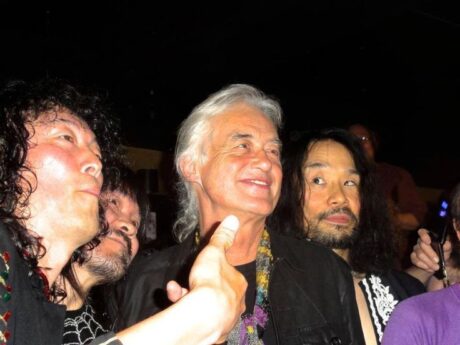
Jimmy Page & Jimmy Sakurai meet in 2012
His story has been told in “Mr. Jimmy”, a recent indie documentary directed by Peter Michael Dowd, himself a dyed-in-the-wool Led Zeppelin fan who sweated blood to get the film made. It is fair to say that Sakurai’s American adventure has had its ups and downs, from a gig in a pizza joint to a manager who compared him to an act at Disneyland.
He joined Led Zepagain, an American tribute band, only to find that that their fans like getting drunk and hollering and only want to hear the famous numbers. Refusing to be a mere “jukebox”, Sakurai’s response is withering: “to play this music in a lazy, lackluster way would be inexcusable.”
Finally, however, he gets as close as you can to the real thing, joining Led Zeppelin Revival – a band helmed by Jason Bonham, the son of Led Zeppelin’s long-deceased original drummer. At the end of last year, they played a sold-out gig in a Roppongi theatre.
In other hands, the film could have ended up as a campy “weird Japan” affair. Instead, it is not really about Led Zeppelin at all or even music. What matters is the purity of Sakurai’s quest and his refusal to compromise.
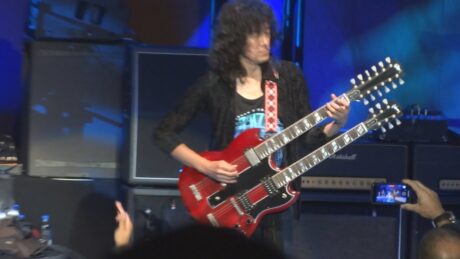
Sakurai wields a double-necked guitar, as made famous by Page
Jimmy Page is his “ikigai”, his reason for living. Everyone should have an “ikigai”. It makes you a stronger, fuller person. You do not have to be an artist. You could be a schoolteacher, a monk, a sushi chef or a mountaineer. You do not need to be Japanese either — although one of the talking heads in the film describes Sakurai’s level of lifelong commitment as “typically Japanese,” and there is definitely something to that.
Some years ago, film critic and Japanologist Donald Richie drew a wry parallel between Japan’s Beatles tribute bands and gagaku, 8th century Chinese court music which persists in Japan a millennium after disappearing from China. Likewise, Richie predicted, in the far future Japan will have “something called The Beatles. It’ll be four people with guitars, and nobody will know exactly what it is, but it will be the only place in the world that will have it.”
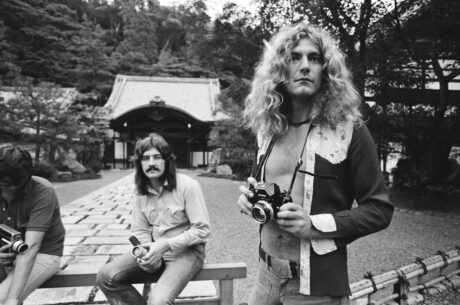
Led Zeppelin in Japan, 1971
What was a throwaway witticism becomes more salient as the rock era, which lasted some 60 years, visibly comes to an end. One by one, the practitioners are leaving for the great gig in the sky, and the possible variations on what is a highly limited format are largely exhausted. After another 60 years, the music will probably sound as remote as the popular songs of 1900 seemed to the rock generation.
Yet, as Richie intimated, if anyone wants a taste of what it was like, Japan will surely be the place to go. In all probability, Japan’s Beatles bands will still be there, playing live on a regular basis. And who knows — perhaps a third generation Mr. Jimmy, wearing the correct jacket and trousers, will be blasting out “Heartbreaker,” “Whole Lotta Love” and “Black Dog.”
